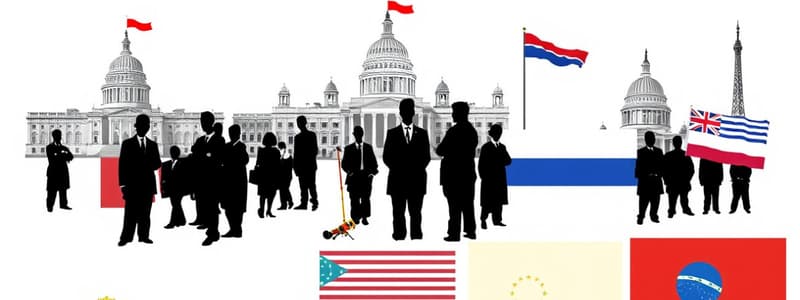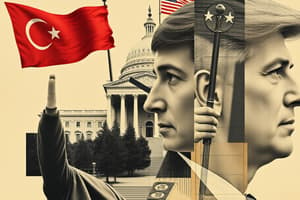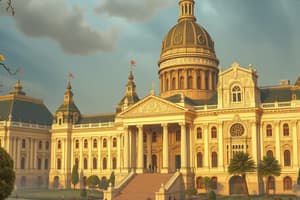Podcast
Questions and Answers
What color on the map represents parliamentary constitutional monarchies?
What color on the map represents parliamentary constitutional monarchies?
- Brown
- Purple
- Green
- Red and Pink (correct)
Which of the following best describes a diarchy?
Which of the following best describes a diarchy?
- A government ruled by a single monarch
- A system where the crown is passed down within a family
- A type of government with no constitution
- A form of government where power is shared between two joint authorities (correct)
What is a characteristic of modern monarchies?
What is a characteristic of modern monarchies?
- Complete political power is retained by the monarch
- They often have limited or no political power according to a constitution (correct)
- They are exclusively hereditary without exception
- The monarch usually has no legal or ceremonial role
Which type of government is exemplified by absolute monarchies?
Which type of government is exemplified by absolute monarchies?
Which statement is true regarding hereditary rule?
Which statement is true regarding hereditary rule?
What color indicates countries where government has been suspended on the map?
What color indicates countries where government has been suspended on the map?
In which scenario might a diarchy occur?
In which scenario might a diarchy occur?
Which option best describes the nature of a constitutional monarchy?
Which option best describes the nature of a constitutional monarchy?
Which of the following statements about diarchy is correct?
Which of the following statements about diarchy is correct?
What characterizes a de jure oligarchy?
What characterizes a de jure oligarchy?
Which of the following best distinguishes de facto oligarchies from de jure oligarchies?
Which of the following best distinguishes de facto oligarchies from de jure oligarchies?
Which of the following options is a characteristic of oligarchies?
Which of the following options is a characteristic of oligarchies?
How can contemporary authors characterize the state of affairs in the United States, according to the content?
How can contemporary authors characterize the state of affairs in the United States, according to the content?
Which best defines the term 'elite' in the context of oligarchy?
Which best defines the term 'elite' in the context of oligarchy?
What is a primary attribute that distinguishes hereditary rulers in a monarchy?
What is a primary attribute that distinguishes hereditary rulers in a monarchy?
What distinguishes a dictatorship from a totalitarian regime?
What distinguishes a dictatorship from a totalitarian regime?
Which statement about totalitarian governments is accurate?
Which statement about totalitarian governments is accurate?
What is a common method through which totalitarian regimes maintain power?
What is a common method through which totalitarian regimes maintain power?
In what way do dictators typically come to power?
In what way do dictators typically come to power?
Which of the following best defines totalitarianism?
Which of the following best defines totalitarianism?
How does democracy contrast with dictatorship?
How does democracy contrast with dictatorship?
Which is NOT a characteristic of totalitarian regimes?
Which is NOT a characteristic of totalitarian regimes?
What typically emerges after the fall of an authoritarian regime?
What typically emerges after the fall of an authoritarian regime?
Which feature is most closely associated with dictatorships?
Which feature is most closely associated with dictatorships?
What is one outcome of totalitarian control over citizen behavior?
What is one outcome of totalitarian control over citizen behavior?
What characteristic distinguishes a monarchy from other forms of government?
What characteristic distinguishes a monarchy from other forms of government?
Which of the following is NOT a feature of totalitarianism?
Which of the following is NOT a feature of totalitarianism?
In an oligarchic government, power is typically held by which of the following?
In an oligarchic government, power is typically held by which of the following?
How does a theocracy fundamentally differ from other government forms?
How does a theocracy fundamentally differ from other government forms?
What key principle distinguishes a democratic government from an oligarchy?
What key principle distinguishes a democratic government from an oligarchy?
Which of the following accurately describes totalitarianism?
Which of the following accurately describes totalitarianism?
What is a common misunderstanding about oligarchies?
What is a common misunderstanding about oligarchies?
Which form of government is characterized by majority rule?
Which form of government is characterized by majority rule?
What distinguishes a constitutional monarchy from a total monarchy?
What distinguishes a constitutional monarchy from a total monarchy?
Which of the following best describes the principle of democracy?
Which of the following best describes the principle of democracy?
Which form of government is characterized by absolute or nominal power lodged with a single individual, often for life?
Which form of government is characterized by absolute or nominal power lodged with a single individual, often for life?
What is a common characteristic of a theocracy?
What is a common characteristic of a theocracy?
What distinguishes an oligarchy from a democracy?
What distinguishes an oligarchy from a democracy?
In what way can totalitarian regimes maintain political power?
In what way can totalitarian regimes maintain political power?
Which of the following accurately describes a democratic presidential republic?
Which of the following accurately describes a democratic presidential republic?
What is a key difference between hereditary and elective monarchies?
What is a key difference between hereditary and elective monarchies?
Which characteristic is commonly associated with authoritarian governments?
Which characteristic is commonly associated with authoritarian governments?
What allows citizens to govern in a democracy?
What allows citizens to govern in a democracy?
In which form of government is power concentrated in a small elite group distinguished by wealth or family ties?
In which form of government is power concentrated in a small elite group distinguished by wealth or family ties?
Flashcards are hidden until you start studying
Study Notes
Types of Government
- Countries can be classified by their government types, represented by different colors on a map:
- Blue: Full presidential republics
- Green/Yellow: Presidential republics with limited presidential power
- Orange: Parliamentary republics
- Red/Pink: Parliamentary constitutional monarchies
- Purple: Absolute monarchies
- Brown: Single-party republics
- Green: Suspended governments (e.g., military dictatorships)
- Grey: Countries not fitting the above categories
Monarchy
- A monarchy is when supreme power is held by an individual, typically known as a monarch, either absolutely or nominally.
- Modern monarchies often take the form of constitutional monarchies, where the monarch has limited political power due to a constitution.
- Hereditary rule is common, though electively chosen monarchs exist (e.g., the Pope).
- As of 2011, 44 nations have monarchs; 16 are Commonwealth realms like Canada and Australia.
Diarchy
- Diarchy refers to a governance structure where two monarchs rule simultaneously.
- Historical examples include Ancient Sparta and 17th century Russia.
Oligarchy
- An oligarchy is characterized by power resting with a small elite group defined by wealth, family ties, or military influence.
- Power dynamics in oligarchies can be:
- De jure: Legally sanctioned power (e.g., aristocracy)
- De facto: Power gained through resources regardless of law.
- Contemporary views suggest aspects of oligarchy exist in the U.S. political landscape.
- Nelson Mandela is noted for becoming South Africa's first president elected in a fully representative election in 1994, ending an oligarchic apartheid system.
Dictatorship and Totalitarianism
- Dictatorship: Power concentrated in a single leader or group without consent from the governed.
- Totalitarianism expands this control to all public and private life, enforced through propaganda and state mechanisms.
- Totalitarian states may utilize mass surveillance, censorship, and promote a personality cult around the leadership.
Types of States
- Governments can generally be categorized as:
- Authoritarian: Power held by unelected individuals; often includes monarchies.
- Oligarchic: Power rests in a small elite, exemplified by theocracies.
- Democratic: Sovereignty lies with the citizens, featuring competitive elections and protected freedoms.
Democratic Principles
- Democracies embody equality in accessing power and recognizing individual liberties.
- Derived from fair competitive elections, democracies must also manage the balance between maximizing freedom and protecting rights.
- Separation of powers is crucial to prevent tyranny, ensuring no branch accumulates too much authority.
Electoral Democracies
- The status of electoral democracies varies globally and is often assessed by organizations such as Freedom House, indicating the health and accessibility of democratic practices in different nations.### Forms of Democracy
- Orange countries represent parliamentary republics.
- Green indicates presidential republics with less power; blue shows those with more presidential power.
- Red signifies parliamentary constitutional monarchies where the monarch does not wield personal authority.
New State Spaces
- Distinction exists between states and nations; states can redefine borders beyond national control.
- New state spaces evolve, often not governed solely by national authorities.
Learning Objectives
- Examine the transformation of political boundaries influenced by globalization.
Key Takeaways
- Global cities, like New York and London, serve as key hubs in the global economic and cultural systems.
- These cities are politically distinctive and often more connected to global networks than their surrounding regions.
- The emergence of regions and international governments, such as the European Union, illustrates evolving state power outside national governance.
Key Points
- Borders denote geographical limits of political entities and legal jurisdictions, but they may not always align with national identities.
- Globalization influences changes in political boundaries, creating new state spaces governed by local, regional, or international bodies.
- Global cities are pivotal in economic hierarchies, influencing international relations and events actively.
Key Terms
European Union
- A supranational organization formed in the 1950s to enhance economic and political ties between European nations.
- As of early 2007, 27 member countries included Austria, Belgium, France, Germany, and the United Kingdom, among others.
Global City
- A city recognized as a critical node in the global economic system, influencing international trade and culture.
- Global cities are evaluated hierarchically, with varying degrees of economic and political impact on global systems.
Political Borders
- Political borders are changing due to globalization, prompting the rise of new state spaces influenced beyond traditional national governments.
- The concept of global cities encourages the understanding of how urban centers interact with global systems rather than strictly adhering to national governance.
Studying That Suits You
Use AI to generate personalized quizzes and flashcards to suit your learning preferences.




